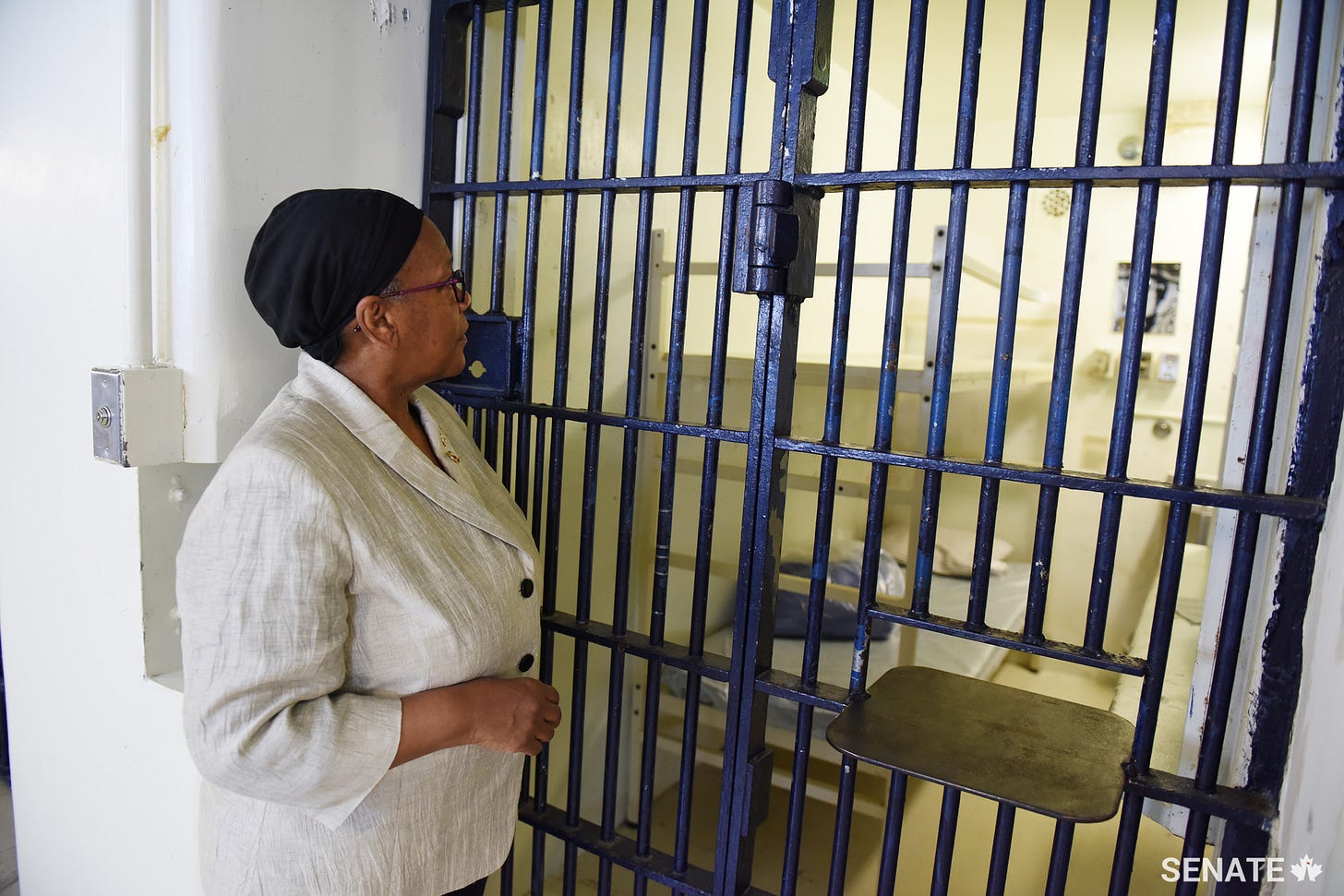Photo: Senator Wanda Thomas Bernard Credit: Senate of Canada
“There is no space for racism, sexism, transphobia, homophobia, ableism and or any other form of discrimination in the federal correctional system. By recognizing the humanity and the unique needs of marginalized and vulnerable groups, federally-sentenced persons will be better prepared for release and more likely to avoid recidivism.” — Senator Wanda Thomas Bernard
Today, I’m honoured to be introducing Small Change listeners to Senator Wanda Thomas Bernard, from East Preston, Nova Scotia.
Dr. Wanda Thomas Bernard is a highly regarded social worker, educator, researcher, community activist and advocate of social change who has worked in mental health at the provincial level and in rural community practice at the municipal level. Since 1990, Dr. Bernard has been a professor at the Dalhousie School of Social Work, where she also served as director for a decade.
In 2016, Dr. Bernard was appointed Special Advisor on Diversity and Inclusiveness at Dalhousie University. She is the first African Nova Scotian to hold a tenure track position at Dalhousie University and to be promoted to full professor.
Dr. Bernard has worked with provincial organizations to bring diversity to political processes in Nova Scotia as well as to teach community members about Canada’s legislative process and citizen engagement. She is also a founding member of the Association of Black Social Workers (ABSW) which helps address the needs of marginalized citizens, especially those of African descent.
As a former member of the Nova Scotia Advisory Council on the Status of Women, as well as its past Chair, Dr. Bernard was instrumental in the development of advice to ministers regarding frameworks for gender violence prevention and health equity.
At the national level, Dr. Bernard has served as a member of the National Coalition of Advisory Councils on the Status of Women. She has served as an expert witness in human rights cases and has presented at many local, national and international forums.
Dr. Bernard has received many honours for her work and community leadership, notably the Order of Nova Scotia and the Order of Canada.
Most recently, Senator Bernard was the Deputy Chair of the Human Rights Committee until the federal government announced prorogation on January 6th at which time all committees ceased to exist.
Senator Bernard, and members of the committee, have been deeply disturbed by the federal government’s refusal to end “draconian” and “cruel and unusual” solitary confinement practices in Canadian prisons.
The federal government refused to implement changes despite the committee releasing a comprehensive report with 71 recommendations in June 2021. That Human Rights Committee report, Human Rights of Federally-Sentenced Persons, was the product of a fact-finding mission launched in 2016. The intensive five-year study saw over 150 witnesses give evidence resulting in 71 recommendations aimed to stem abusive and discriminatory practices that dehumanize prisoners while inhibiting their rehabilitation and community integration.
In fact, the response from former Prime Minister Trudeau and his cabinet was shockingly inadequate, neglecting key issues raised by the committee. Add to that the fact that relevant ministers refused to appear before the committee and when the committee turned to the then Prime Minister for a more meaningful response, they received a scant, four-paragraph note referring them back to Public Safety Minister Dominic LeBlanc.
The committee has stressed that this persistent inaction is not just a violation of human rights, it poses a real threat to public safety because most prisoners will eventually return to society.
Senator Bernard lays bare the conditions folks in solitary confinement have to endure including the mistreatment of an inmate at East Coast Forensic hospital in Dartmouth, NS who spent more than 20 years in custody, including ten years in solitary confinement, before being diagnosed with schizophrenia and eventually placed in the mental health system where she belonged.
Senator Kim Pate shares a hug with a female hospital resident. The woman spent more than 20 years in custody — including ten years in solitary confinement — until she was diagnosed with schizophrenia and finally placed in the mental health system. For many people dealing with mental health issues, help only comes after they’ve entered the criminal justice system — if at all. Credit: Senate of Canada
Senator Kim Pate, Member of the subcommittee on agenda and procedure stated, “It’s been 17 years since Ashley Smith died isolated in a segregation cell. Despite decades of investigations, reports and court cases revealing the urgent need to address systemic discrimination, ensure correctional accountability and remedy wrongdoing, the federal government has virtually eliminated oversight of corrections.”
Senator Bernard also discusses what she and other Senators saw and heard when they visited Atlantic Institution, a men’s maximum-security facility in Renous, NB., and why Senator Bernard chose to wear a wave cap, also known as a durag, during that prison visit among many others.
Senator Wanda Thomas Bernard on prison tour wearing a durag Credit: Senate of Canada
In response to appellate court decisions in Ontario and British Columbia, the federal government claimed it ended the practice of solitary confinement — known as administrative segregation — with the creation of structured intervention units (SIUs) in 2019. SIUs were supposed to guarantee prisoners received basic levels of care, human contact and time outside of their cell.
However, the third annual report of the government’s Structured Intervention Unit Advisory Panel, released in July 2024, came to the same conclusion that can be found in their previous reports: “SIUs are not addressing the problems they were designed to address,” and found, “no meaningful or consistent improvements in operations over four years.”
A typical cell in the segregation unit bears traces of its occupant. The committee has heard from witnesses that being held in segregation for even short amounts of time can negatively affect prisoners’ mental health — particularly if they have existing mental health problems. Credit: Senate of Canada
Senator Bernard explains what SIUs are and why the Structured Intervention Unit Advisory Panel concluded that they are not addressing the problems inherent in the use of solitary confinement.
Since releasing its report, Human Rights of Federally-Sentenced Persons, the committee has sought a meaningful federal response to the many abusive and discriminatory practices it identified.
In fact, Rule 12-23 (1) of the Rules of the Senate allows the Senate to request “a complete and detailed response” from the government to a committee report adopted by the Senate. The government must respond within 150 days or explain why it couldn’t.
When Public Safety Minister LeBlanc released the initial government response to the committee’s study, a number of recommendations were only partially or inadequately addressed, while many others were completely ignored. Despite agreeing to meet with the committee, LeBlanc subsequently declined to discuss the government’s woeful response.
The Human Rights Committee was also disappointed that Justice Minister Arif Virani and former government leader Steven MacKinnon did not responded to recommendations relating to their areas of responsibility.
The Human Rights Committee urged cabinet to produce a detailed response to each recommendation that would include the government’s position on each recommendation, an explanation for its position and, where applicable, a timeline for action.
The Correctional Investigator of Canada subsequently told the committee the response was “not proportionate to the gravity of the findings” made in the report. Senator Bernard explains the role of the Correctional Investigator of Canada and why their conclusion is so significant.
We also discuss the role a Universal Standard of Living, aka Universal Basic Income, could play in reducing initial incarcerations as well as the role life skills and access to trades training or university degrees could play in reducing recidivism.
According to Senator Bernard, “The human rights violations that occur in Canada’s prisons each and every day are an injustice. By its inaction and indifference, the federal government is complicit in perpetuating these injustices, particularly against vulnerable and marginalized groups.”
Senator Bernard discusses the next steps to remedy solitary confinement practices in Canadian prisons while improving inmate outcomes and reducing recidivism.
A typical cell in the segregation unit bears traces of its occupant. The committee heard from witnesses that being held in segregation for even short amounts of time can negatively affect prisoners’ mental health — particularly if they have existing mental health problems. Credit: Senate of Canada
Addition information:
Read the report: Human Rights of Federally-Sentenced Persons.
Find photos and articles about the committee’s fact-finding missions to Canada’s East Coast, West Coast, Prairie and women’s prisons.
Follow the Standing Committee Human Rights on social media using the hashtag #RIDR.
Subscribe to email alerts for Senate committees.
Sign up for the Senate eNewsletter.
Link to podcast with Ontario Criminal Lawyer Alison Craig (March 13, 2025) who speaks truth about Ontario's bail system and jails.
Thanks to everyone who read today’s article and listened to my podcast. With your financial support, a little Nicoll can make a lot of change.
Music: Real Estate by UNIVERSFIELD is licensed under a Attribution 4.0 International License. freemusicarchive.org.
*Be sure to download the Substack app to get the most from your podcast experience.
















Share this post